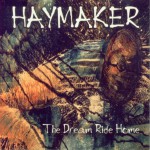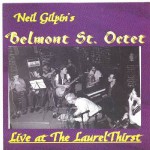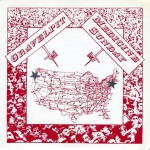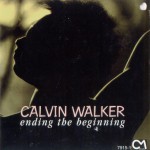 Haymaker
Haymaker
The Dream Ride Home
Ash Music
For Haymaker’s devoted legion of fans, this full-length CD has been a long time in coming and will no doubt sate their hunger for a definitive recording from the band. It stands as a collection of songs culled from Haymaker’s four years on the boards in Portland; and as a tribute to basic American values: Booze, Pickup Trucks and Broken Hearts.
Lovers of the chiming G chord and a country twang thang will find a lot to chew on in Steve Lockwood’s songs. He delivers his homey homilies in an understated drawl, as comfortable as a rockin’ chair on a front porch. He is ably backed by lead guitarist Kevin Jerde, bassist Jeff Farnand and drummer Rick Barry— with occasional interjections from Robert Trujillo on harmonica and Celo V’ec on violin.
A basic rewrite of any number of Cajun flavored tunes, “Come On Down” kicks off the 13 song set in rousing hoedown fashion, chugging along like a bottle of Ripple in the hot sun. Jerde contributes a fiery solo over Trujillo’s animated harp extrapolations, while Lockwood extols the virtues of the good life: “Time is ticking, my watch is broken/The bills are late, there’s beer in the fridge/The car won’t start, but we’ll be rolling/With the sunburn victims with life to live.” Okay, fine.
The following five songs, “Ride,” “Dream,” Pretend,” “Storm” and “Home,” represent the core of Haymaker’s repertoire; probably the most mature elements of their work. “Storm,” especially, attempts to go beyond the sometimes rigid constraints of the band’s chosen musical genre.
But all five stand up as well-constructed pieces of musical Americana. “Ride” rings like the Eagles’ version of “Take It Easy,” a hint of woe in the forlorn quality of Lockwood’s vocal and Trujillo’s moaning harp. “Dream” is closer to wistful in its freight hoppin’ feel. V’ec’s mournful violin and Trujillo’s wailing harmonica augment Jerde’s effectively simple guitar solo. Time changes— from the uppity verses, to the slow waltz of the bridges, lend the song a certain Grateful Dead hue.
“Pretend” is a snaky, bluesy number. A swampy slide guitar slithers across the musical scenery, as Lockwood unfolds a tale of love gone sour. “Last week I got in my pickup truck/And I got the fuck out of here/Dom Perignon and all your friends carrying on/Made me sick in my own home.” Given these unfortunate domestic circumstances, it would only seem natural that the pickup truck driver would seek solace in the arms of another. “So I drove to the coast/In a bar met up with a fisherman’s widow/And she was lonely, but real.” We can all be thankful for that. The “Fisherman’s Widow” series of inflatable dolls, never did really take off. “She took me home, then took my clothes off…” One wonders what she was doing with his clothes on in the first place. “Then she took me until my pain disappeared.” Well alright fisherman’s widow!
Living up to its name, “Storm” slowly builds in intensity, as tempest clouds of guitars and violin circulate through thundering drums and bass. By far the most ambitious number of the set, Lockwood takes a more pantheistic approach to the lyrics, painting a moody portrait of an angry ocean storm hitting a vulnerable coastline.
Continuing the pensive mood, “Home” is a lazy, dusty tune that blows like a hot breeze through acres of brittle wheatfields. “Killer Of Men” and “Smokin’ Cigarettes,” a tune that goes back to Haymaker’s early days, raise the atmospheric activity level, with different takes on the theme of hard drivin’, good ol’ boy rockers.
“Dime Holding Up A Dollar,” benefits from Jerde’s polished slide guitar figures and Barry’s complementary drum work, taking the tune through sluggish backwaters and crunchy rapids with equal aplomb.
The succeeding three cuts were taken from a live performance at Seattle’s Crocodile and find Haymaker in a laid-back mood. Sounding uncannily like the Ozark Mountain Daredevils on “Powerlines.” One half-expects the Fisherman’s Widow to turn up on that bus “outside of mayhem rolling through the rain;” all sung to the chord progression of Neil Young’s “Helpless.”
Holding to the lonesome tumbleweed motif, “Empty” finds Steve adapting a heavier hick accent than usual, ostensibly to underscore the homely platitudes he utters over an arrangement freely adapted from the Stones’ “Wild Horses.” However, from out of nowhere, he breaks into a very nice falsetto in the uncharacteristic chorus; a chorus that echoes certain Soul qualities heretofore kept well hidden by Lockwood and Haymaker. And given the frivolously fickle nature of the mu-sick biz, this would seem to be a logical musical avenue for the band to explore.
For, all things considered, it would seem the country rock vein has been pretty much mined-out, yet again. And though Haymaker are among the best at makin’ a guy wanna jump in his pickup, get tanked up on cheap whiskey and set out to lookin’ for that Fisherman’s Widow, their time may not come again for another seven years. In the meantime, this well-seasoned band would benefit by learning and mastering a few other musical styles. They intimate such leanings at points along the way here. Fleshing out those musical sketches would do Haymaker well.
 Neil Gilpin’s Belmont St. Octet
Neil Gilpin’s Belmont St. Octet
Live At The LaurelThirst
LaurelThirst Records
An all-star lineup (something in excess of the advertised eight) backs the Eastside mainstay Gilpin through fourteen tunes, all but two of which are covers; spanning the past seventy years of popular music. Gilpin, whose quest for authenticity is matched only by his boundless enthusiasm, recorded this set with the band over five nights in March of 1996. The result is a recording that makes up with vitality what it may sometimes lack in sonic majesty. The resultant recording could as easily have been taken from the Jazz Archives of 30’s recordings as anything from the present. Timeless.
Drummer Randy Givens and percussionist Eddie Lakaden lay down the rhythm while keyboardist Mike Danner and mandolinist Dan Haley join bassist Tim Acott in laying the foundation over which Gilpin and Russ Miller pluck syncopated guitar licks. Jamming over the top, Lee Reinoehl interjects muted trumpet lines, trading off with Miguel Maldonado’s sax and Johnny Ward on the “saxello.”
Danner and Haley lead the crew through the jaunty strides of “Lime House Blues.” Maldonado takes his moment in the spotlight with a superb rendition of “Harlem Nocturne.” With those two instrumentals out of the way, Gilpin takes a turn at the vocal mike lending elements of Cab Calloway, Big Bill Broonzy and Tom Waits to his treatment of the blues chestnut “St. James Infirmary.”
Neil cranks up the heat with a scorching version of “Don’t Put No Headstone On My Grave,” and a smooth take on “Mean Woman With Green Eyes.” Haley and Miller turn in sizzling solos in the intro of “Why Don’t You Do Right.” Danner nails a tasty piano solo in the middle, later joined by all three horns in a delicious melange of blues and hybrid Dixieland jazz.
The Octet venture into the realm of bebop with “Stolen Moments,” the horn section proving their mettle on the technically challenging intro; while Miller and Maldonado contribute flashy solos in the breaks. Haley unleashes a torrential mandolin solo on “Hesitation Blues,” while Danner holds down the fort for Gilpin’s vocal gymnastics.
The Latin feel of Duke Ellington’s “Caravan” serves as a brief interlude before the band swings into the turns; and into a series of deft solos— the highpoint of which is Ward’s exotic saxello phrasing and Haley’s searing slide mandolin work; simultaneously reminiscent of David Grisman and Papa John Creach. Ba— boom!
The band delivers a faithful interpretation of the 30s classic “Brother Can You Spare A Dime.” Neil’s voice unintentionally breaking in the verse, adds an element of pathos to the proceedings. A return to a Latin feel with “Saint Thomas,” concludes the set.
Neil Gilpin, and many members of the Belmont St. Octet, have been stalwart citizens in goodstanding of the Eastside musical community— whose existence extends fifteen years to the days of the Dublin Pub. This wonderful recording serves as a fitting tribute to those musicians and the delightful musical tradition they uphold.
 Richmond Fontaine
Richmond Fontaine
Safety
Cravedog Records
Richmond Fontaine started out life being called the Impalas. They even went so far as to release a six-song cassette of their work, under that moniker. However, somewhere along the way, fate and a writ to cease and desist compelled the Impalas to think about changing their name; owing to the fact that there already was an Impalas floating around out in the universe— unamenable to sharing the appellation. Thus, Richmond Fontaine was born. This handy reference recording allows us to compare their material (three of the aforementioned six songs) before the name change and after (nine new tunes): by which to observe any noticeable alteration in their musical nomenclature.
And it is my pleasure to report that Richmond Fontaine’s recorded effort stands up well to those they lent to their previous incarnation. No one will be disappointed. All will be pleased. Their sound is intact— comprised of the dissonance of Dinosaur Jr. translated through a Skiploader/Pond informed local focus, the folky/country sensitivity of Haymaker mixed with the melodicism of Everclear and the jagged energy of Dead Moon. Truly this is a thrashy trio derived from the Portland underground.
“Dayton, Ohio” and “Harold’s Club,” holdover songs from previous days, stack up well next to the newer “Settle,” an acoustic flavored piece, augmented by the addition of Neil Gilpin’s mournful pedal steel guitar solo. “Safety” rides on a wave of jangling guitars, while delivering a powerful tale about the bondage of human frailty, the animal curse of existence.
The two chord drive of “Riverhouse” could easily pass for the early work of Everclear— either the band or the refreshment. Dave Harding’s waltzing bass dances beneath vocalist Willy Vlautin’s descending guitar runs and Stuart Gaston’s marching drums on “White Line Fever,” an early tune in their catalogue. “Novocaine,” with it’s shimmering acoustic and jangling electric guitars, and twangy vocals could easily be the work of Haymaker, except the subject is drugs instead of alcohol.
Likewise, “Whirlpool” circles around a folk-rooted feel, in a piquant maëlstrom of turbulent emotions and uncoiling guitar filigree. “1968” seems like a speeded up version of the previous song, carried along by Gaston’s sputtering drums and Vlautin’s flatpicking flail upon the guitar. Gaston adds a surf context to the root-based guitars on “Wagonwheel Motel,” a sordid tale of life on the run, nicely accented by Vlautin’s hiccuping guitar fills.
Vlautin is a capable songwriter and storyteller with a voice that is evocatively anguished in character. The band play well together, if somewhat rudimentally. A few more years spent plying their craft, could bode well for the captivatingly ingenuous qualities of which Richmond Fontaine are so generously endowed.
 Split Single
Split Single
Gravelpit/Medicine Sunday
Rainforest Records
The opposite ends of the continent are joined together for this split single. Gravelpit contribute another in a long line of melodic efforts with “Mistakenly.” Sounding more like a 90s version of Blue Oyster Cult every day, the band combine Grant Cumpston’s chunky guitar riff with heavily layered harmonies over Steve Wilkenson’s smooth lead vocal. A nice turn in the bridge adds a pleasant musical surprise. A distinct Alice In Chains meets Stone Temple Pilots sound pervades throughout the track. Yeah, Blue Oyster Cult.
With “The Horror,” New York’s Medicine Sunday rock harder than their West Coast counterparts. A roiling bass/piano figure drives the cut through a number of rhythmic and stylistic changes, while maintaining a certain gothic stance throughout the passage of the piece.
With the release of this recording, Rainforest Records has cemented its position among the more high-profile labels based in Portland. A growing catalogue, which includes recordings by Gravelpit, Cheralee Dillon, Doris Daze, Jesus Presley, the Treefrogs, New Bad Things, and Roger Nusic is as illustrious of a lineup as is to be found anywhere on a local level.
 Sweet Baby Onion
Sweet Baby Onion
Sweet Baby Onio
Ten Ton Records
With Jo Bronstein, add another clever young singer/songwriter to the growing list of talented women performers to grace Portland’s club stages. Bronstein takes her cue from the likes of Jonatha Brooke, Jane Siberry, Jewel, Sara McLachlan, and maybe a laid back touch of Aimee Mann; while lending her own very distinct voice to the potpourri.
Friendly songs, such as “Take Me Home,” “Just Love,” “I Like You” and “Caterpillar” establish one aspect of Bronstein’s musical personae— that of something akin to a musical girl next-door.
But it’s with “It’s Not Because” that Jo distinguishes herself as a songwriter and singer. Over jagged acoustic guitar chords, she hauntingly whispers the verses before slipping into the delicate contours of the chorus.
And it is with “Warm-Hearted Blessing” that Bronstein bares her soul—clinically analyzing the petty deceits and desultory levels of commitment that slowly pull a relationship apart. Her bitter recriminations and acidic diatribes owe more to Alanis Morrisette that to Joni Mitchell.
The other members of Sweet Baby Onion, drummer Dan Reid and bassist/backup vocalist Sean Flora lend smart support to the inventive “Four Years” and the thoughtful, Cranberries informed “I Wish You Were Mine.” Maria Callahan of Doris Daze adds stellar guitar to “Fear Of Heights” where Jo and Sean layer a nifty choral arrangement to the vocals. Heavily effected guitars on the verses of “He’s A Big Bloke” add weight to the emotionally charged lyric; giving way to the waltzing folk setting of the chorus.
Sweet Baby Onion are a tight and affecting trio. Jo Bronstein’s well-hewn songs are the work of a talented writer with a very bright future. And her ability as an interpreter of those songs place her near the top of a long list of talented local women performers.
 Petty Cash
Petty Cash
Shrouded By Angels
Self-Produced
Count Janet Julian among that ever-growing list. Her angelic voice, simple acoustic guitar phrasings and introspective lyrics are given intrepid Bluegrass (with several stylistic variations) support by fellow Cash-iers Dan Haley on mandolin and Francis Regan on banjo; while receiving the benefit of Haley’s keen ear for vocal harmonies. The result is a sparkling set of ten songs that flow as fresh and pure as a mountain stream.
And what glorious harmonies they are— so finely crafted, so seamless. It often seems as if but a single voice is broadcasting three pitches simultaneously. Certainly not an easy achievement, which explains the paucity of close harmony in Popular music today.
Check out the jolly “Deception Creek” for an example of the form. The verses pass in a typical vocal fashion. But it is in the bridge where Janet, Dan and Francis execute difficult parts with razor precision. Ouch!
The pretty ballad “La La Song,” thick with layered harmonies, trucks along on Regan’s skipping banjo and Haley’s skating mandolin. A swamp feel, similar to Neil Young’s obscure “Love Is A Rose,” invests “Turnip Song” with a wry sense of humor, made more obvious by the pun-filled lyrics (a clear sign that Haley had a hand in their creation).
Regan and Haley get a chance to stretch out in the breakdown sections of “Psychosomatic,” a song where Francis turns in a fine Tom Petty-flavored vocal performance. Haley adds a high-flying harmonica solo in the middle, while pearl smooth harmonies turn through the chorus.
“Little Piece Of Land” calls to mind the work of Mary McCaslin in the early 70s: direct, funny and slightly sarcastic. The ubiquitous Neil Gilpin (isn’t he mentioned in nearly every review appearing this month? Haley is a close second) adds a warm steel guitar to “Someone Better.” Sharp, call and response harmonies in the bridge, between Janet and the boys, call to mind the Beatles; while Gilpin adds a cryingly purty steel solo in the break. A real keeper of a tune.
Ralph Huntley drops in to lend classy cocktail piano flourishes to Regan’s “Earthworm,” a song that turns nicely on Janet’s well-timed falsetto vocal inflections.
Haley’s inventive pizzicato mandolin in the intro sets the mood for “One Step.” Mike Danner (here we go again— oh the Eastside music scene is so incestuous !) contributes a seriously ominous organ track, leading the ensemble far away from the definitive Bluegrass groove into some uncharted territory. Imagine John Hartford and David Grisman jamming with the Animals on “House Of The Rising Sun.” Different? You bet!
Finally, the title track, a down home waltz, is supplemented by a witty, Beach Boys inspired, Salvation Army band coda to. A fitting conclusion, indeed.
This is wildly fun stuff— original, charming and memorable. The unremitting splendor of the vocal harmonies are the true key here. For the Bluegrass trappings merely serve as a musical garment; a cloak to disguise the fact that these are simply well-written Pop songs, that would sound just as good in any stylistic costume.
 Calvin Walker
Calvin Walker
Ending The Beginning
CM Records
Something of an anthology of tunes Calvin has penned with an assortment of co-writers over the past decade, Ending The Beginning adheres to a fairly strict Funk format— showcasing musical elements that almost seem archaic by today’s more “sophisticated” musical standards. For this recording is rife with thumb-plucked bass lines, syncopated drum patterns and shimmering synth string pads.
Still, a deeper truth arises. In the world of Rock and Roll, nothing is lost and everything is recycled. What seems tired and dated today, is the “new” sound of tomorrow. \
So, as the era of one Prince (formerly known as the artist formerly known as…) comes to a conclusion, can the era of the New Prince be far behind? If that is true, certainly this is the most aptly named recording of the past several years.
Particular songs stand out as being exceptional examples of their genre. “Goody Goody Two Shoes,” culled from Calvin’s stock of late 80s material still holds together as a piece of cotton candy confunkshun. “How Could I Be So Stupid,” “The Door Is Always Open” and “One In A Million,” written in the past couple of years, prove that Calvin isn’t caught in a time warp. One hears aural references to the music of Jeffrey Osborne, James Ingram and Peabo Bryson circulating through his newer arrangements.
These arrangements drip production values. Every track reflects meticulous attention to detail. Nothing is out of place. There is a space for every intricate nuance: every bell-like synth trill, every fluttering paradiddle, every funky flam. Such sonic preoccupations often lead to a sterile working environment for a vocalist. And so it is that Calvin often sounds as if he’s afloat in a musical ocean of his own creation.
But make no mistake. Calvin Walker is the consummate professional. And those preoccupations with detail have led him to assemble, from time to time, the most sophisticated backing musicians this city has to offer. And in the end— quality is where you find it. And that is just the beginning.
